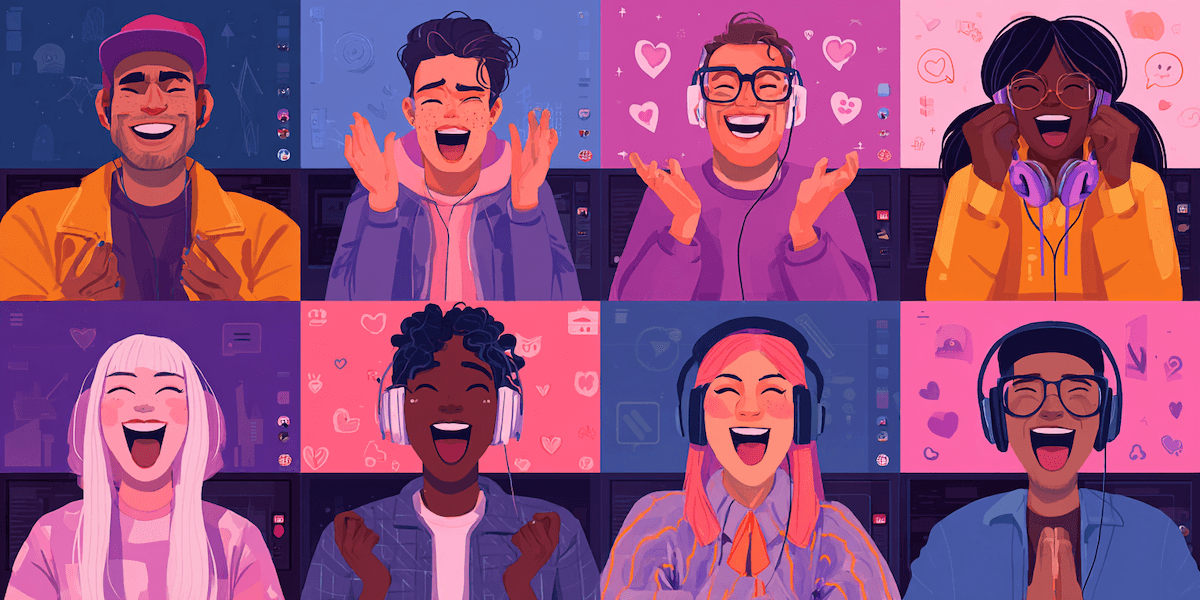
Bin Han developed a “virtual humans” system focused on extroversion, due to be presented at the prominent IVA 2025 artificial intelligence conference (Photo/Midjourney).
Artificial intelligence might be picking your stocks or suggesting Netflix movies, but if you ask Bin Han, a third-year Ph.D. computer science student at the USC Viterbi School of Engineering’s Thomas Lord Department of Computer Science, AI still has a long, long way to go in one key area.
Personality.
“There has been a lot of advancement recently in artificial intelligence technology, but I think we still have room to improve for emotional intelligence,” Han said. “I want to contribute to that domain to make AI more socially intelligent and understand users’ emotions better.”
Han’s work has refined AI’s capacity for social and emotional intelligence. Her recent study, “Can LLMs Generate Behaviors for Embodied Virtual Agents Based on Personality Prompting?” will be presented at the 25th ACM International Conference on Intelligent Virtual Agents (IVA 2025) this September in Berlin. Her USC Viterbi co-authors included Deuksin Kwon, Spencer Lin, Kaleen Shrestha, and Professor Jonathan Gratch, director for virtual humans research at the USC Institute for Creative Technologies.
The study proved that AI agents — virtual human avatars instead of merely text or voice-based AI chatbots — can adapt to assume certain personality traits, testing these agents on human participants in a controlled experiment. In doing so, Han and the researchers created empathetic AI agents that can accurately reflect people’s personalities in real time, increasing their effectiveness in a variety of real-world scenarios.
Han believes her research could lead to improved mental health treatments, among other beneficial outcomes.
The study began as a project in Gratch’s class, “Affective Computing,” which explores how algorithms can sense and respond to human emotion. In 2004, Gratch, a USC Viterbi research professor of computer science and psychology, co-developed EMA alongside Stacy Marsella, one of the first computational models to afford machines “emotional intelligence.”
Gratch said that a personality-fluid AI agent that adapts to your way of speaking could soon open the door to much smoother human-AI interaction.
“You might imagine another step is to create these agents that adapt to you as they learn more about you over time,” Gratch said. “They can better align themselves, not just in terms of your needs, but also the way you want those needs communicated to yourself.”

An example of how the virtual humans system developed by Bin Han works in practice (Photo/Courtesy of Bin Han).
In this study, Han and her team focused on calibrating AI models to become more extroverted or introverted depending on the person it was interacting with. The goal was for the AI agent to match users’ own personalities and conversational preferences so it can better interact with the user.
“I think a major domain that we can use this kind of technology is the mental health domain, because it’s good to have a conversation when people feel depressed or a little blue,” Han said. “If they want to share concerns, it would be good to share [with] a human-like thing, not only voice or text-based interaction.”
Other uses for these AI agents include the business world, where negotiation and conflict resolution are key to day-to-day operations. If people are nervous about a business decision or even negotiating a pay raise, it might be beneficial to test out their approach with an AI avatar, which could simulate a compatible conversation partner.
“If we adopt a virtual agent system, then we can practice salary negotiation with a virtual agent, and we can [also] use it for strategy for a real-life company,” Han said.
This kind of simulation is already possible, and it will only get better as Han and her team continue to develop these models.
AI, meet human emotion
Han’s decision to use extroversion as the sole personality trait to train these AI agents on was rooted in psychology, choosing just one trait for simplicity’s sake to start. Extroversion is known in psychology as one of the “big five” personality traits — alongside openness, conscientiousness, neuroticism and agreeableness — that are commonly used to understand people at a basic, predictable level.
In an unrelated 2025 study at the University of Chicago, researchers found that “people like extroverted robots — but they relate to the neurotic ones.”
Studying these traits — Han said she plans to examine the other four in the future — is a way to explore just how far these AI models can go. For her part, Han believes that AI can become significantly more socially and emotionally intelligent, to the point where it can give informed feedback to users daily.
“My future works are going to contribute to make AI more socially intelligent, understand users’
emotion better and give some thoughts or feedback about how to improve our daily life,” Han said.
Gratch believes that this project represents a step in expanding AI’s potential.
“It’s part of a general trend to unpack and investigate just what [AI models] can and cannot do,” Gratch said. “We’re actually showing they understand not just text, but nonverbal communication around the general topic of social intelligence.”
Added Gratch: “There’s research that [suggests that] things like personality matching are useful for influence,” Gratch said. “So, if you want to persuade someone to take their medication or to buy a more expensive car, you adapt your style to the style of the person you’re interacting with.”
Published on September 5th, 2025
Last updated on September 5th, 2025
